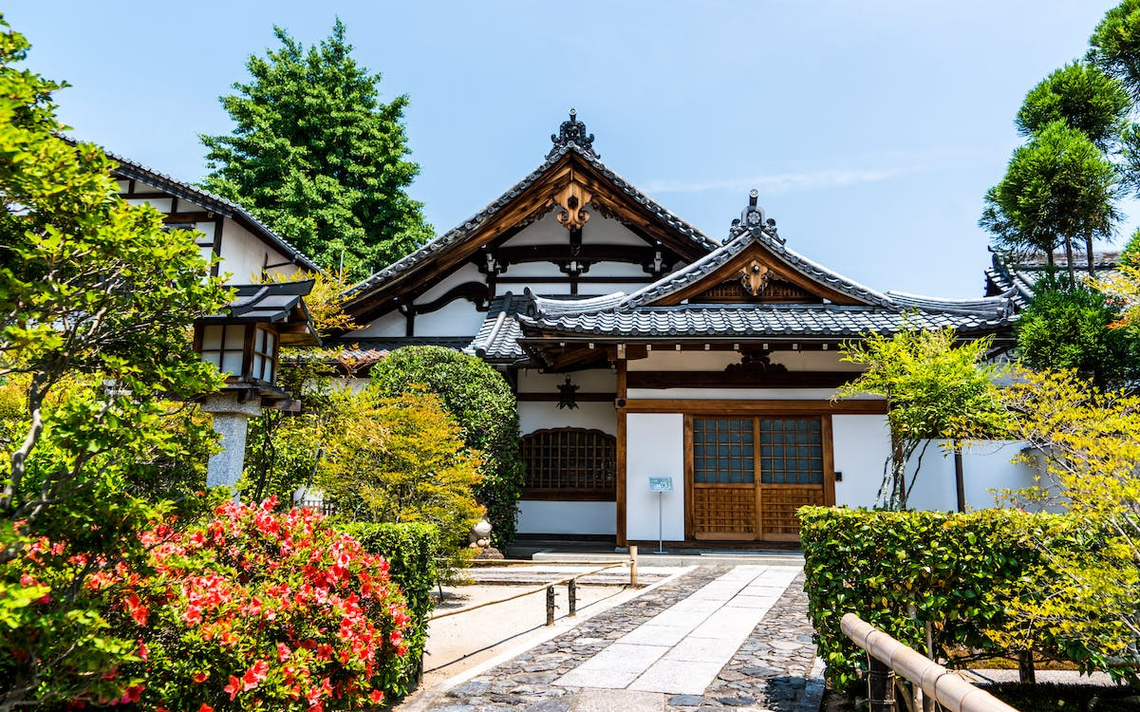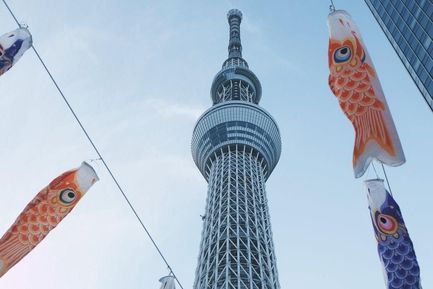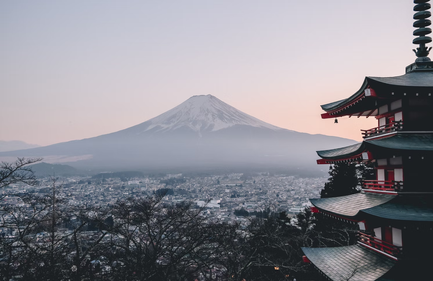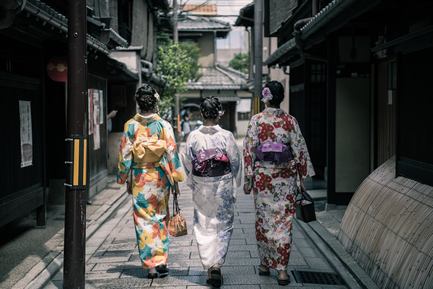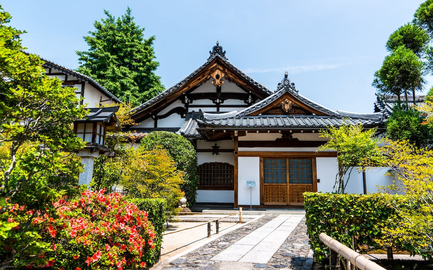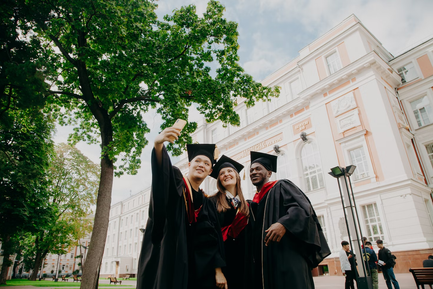
Secondary education in Japan
Secondary school in Japan starts from grade 7 and lasts until grade 9. Grades 10 to 12 are dedicated to high school and are not mandatory to attend.
Students who graduate from grade 9 may choose not to continue their studies, but more than 95% prefer to go to high school to prepare for university. However, getting admitted to a university is quite difficult due to the limited number of seats and high competition. In addition, not only the results of entrance examinations are taken into account, but also the student’s behavior during studies in high school, as well as community service. High school graduates pass the national test and go to universities.
Subjects in high school are divided into three categories: compulsory, moral education and additional disciplines. Compulsory subjects include Japanese language and literature, arithmetics, social and natural sciences, music, visual arts, arts and handicrafts, computer science, and physical education.
Most students also participate in various clubs. Usually they are divided into two large groups: sports (swimming, football, kendo, judo, tennis, etc.) and cultural (English, calligraphy, mathematics, science, etc).
In Japan, there are also Juku (Cram Schools), which help students to prepare for exams and memorize material passed in a regular school. Students can spend up to 12 hours a week in such schools, especially during the final exams and national tests before entering the university.
Education in Japan is of high quality and recognized world-wide. The QS international ranking has included five Japanese universities in the list of top 100 universities in the world. Japan is the 9th most popular destination for training[1]. Over 140,000 international students from 170 countries around the world study here. Japan is a renowned leader in innovation and technology, providing students with unique opportunities for theoretical and practical training. The Land of the Rising Sun also attracts foreigners with its mysterious culture, amazing cuisine and unique architecture.
Advantages of studying in Japan
- International Rankings. Japanese universities occupy high spots in the lists of the top world universities. For example, THE (Times Higher Education) included two universities in the top 100: Kyoto University ranks 36th and Tokyo University 65th[2]. Five Japanese universities made it into QS list of top hundred universities: Tokyo University (22), Kyoto University (33), Tokyo Institute of Technology (58), Osaka University (71) and Tohoku University (82)[3].
- Japanese culture is one of the main reasons why international students choose Japanese universities[4]. More than 20 UNESCO World Heritage Sites are located here: Himeji Castle, Mount Fuji, which is considered the symbol of Japan, Itsukushima Shrine and many others. Japanese cuisine, hot springs, sakura blossom and holiday festivals — students from all over the world come here to plunge into the culture of Japan.
- English language programs. In order to study in Japan, it is not mandatory to learn Japanese. More than 800 educational programs of bachelor’s, master’s and doctoral studies are taught entirely in English. Moreover, while studying, students can additionally study Japanese and, with a little effort, obtain sufficient language proficiency by the end of their studies.
- Center for Science and Technology. Japan is considered the most technologically and scientifically developed country. Japanese scientists have made a huge contribution to the development of the automotive industry, optics, robotics and electronics. Also, more than 50 largest world companies (Global 500)[5] are located here, many of which are recognized leaders in their respective fields. This opens up unique study, internship and subsequent employment opportunities for students.
Disadvantages of studying in Japan
- Mandatory preparation for university. In case a student's home country has 11-year secondary education system, he or she must complete the 12th grade before entering a Japanese university. That can be an extra year of college or university in a home country or a long-term language course in Japan with the addition of Japan's general education program.
- High barrier of entry. In order to enroll in a Japanese university, all high school graduates must pass national exams (nyūgaku shiken). Of all applicants, only half successfully pass the tests. Another obstacle will be high competition — the number of seats in universities is limited, and the number of people wanting to study grows bigger every year.
- Japanese language. Despite the fact that the student can choose a program taught in English, most residents of Japan do not speak English. For everyday communication and a comfortable life outside the university, students will have to learn Japanese.
- The cost of training. The average tuition cost at a Japanese university is not high compared, for example, to British and American universities. However, studying in some other countries like France or Germany is much cheaper. Students pay about 6,010 USD annually. In addition, Japanese universities have a one-time registration fee of 1,415 USD and additional costs for medical insurance, textbooks, and equipment.
- Gender inequality. According to OECD, Japan ranks third among the countries with the largest gender pay gap: it is almost 25%[6]. In 2018, a big scandal broke out[7] when the largest medical university[8] of Japan admitted evaluating male students’ entrance tests higher than females’ in order to “ensure more men become doctors”.
Cost and Structure of Education in Japan
| Program | Min. age | Duration | Min. cost | Avg. cost | Min. language level | Exam |
|---|---|---|---|---|---|---|
| Summer Camp | 6+ | 2 months. | 1,208 USD/month | 2,494 USD/month | N5/A1 + | - |
| Language school | 16+ | 6 months – 2 years | 110 USD/week | 149 USD/week | N5/A1 + | - |
| Secondary school | 12+ | 6 years | Free (state) | 2,262 USD (private) | N2-N1/B2 | - |
| Foundation | 18+ | 1-2 years | 3,684 USD/year | 3,981 USD/year | N5-N1/A1- C1 | JLPT |
| College | 15+ | 2-3 years | 4,976 USD/year | 5,558 USD/year | N2-N1/B2 | JLPT/IELTS |
| Bachelor’s | 18+ | 4-6 years | 5,280 USD/year | 5,752 USD/year | N2-N1/B2 | JLPT/IELTS |
| MBA | 22+ | 1-2 years | 3,463 USD/year | 10,986 USD/year | N1/C1 | JLPT/IELTS |
| Master’s | 22+ | 2 years | 5,280 USD/year | 6,010 USD/year | N1/C1 | JLPT/IELTS |
| Doctoral | 24+ | 3 years | 5,687 USD/year | 6,139 USD/year | N1/C1 | JLPT/IELTS |
In general, there are six types of higher educational institutions in Japan:
- Universities
- Junior colleges
- Colleges of technology
- Professional training colleges
- Japanese language institutes
- Graduate schools
The options for admission to universities in Japan
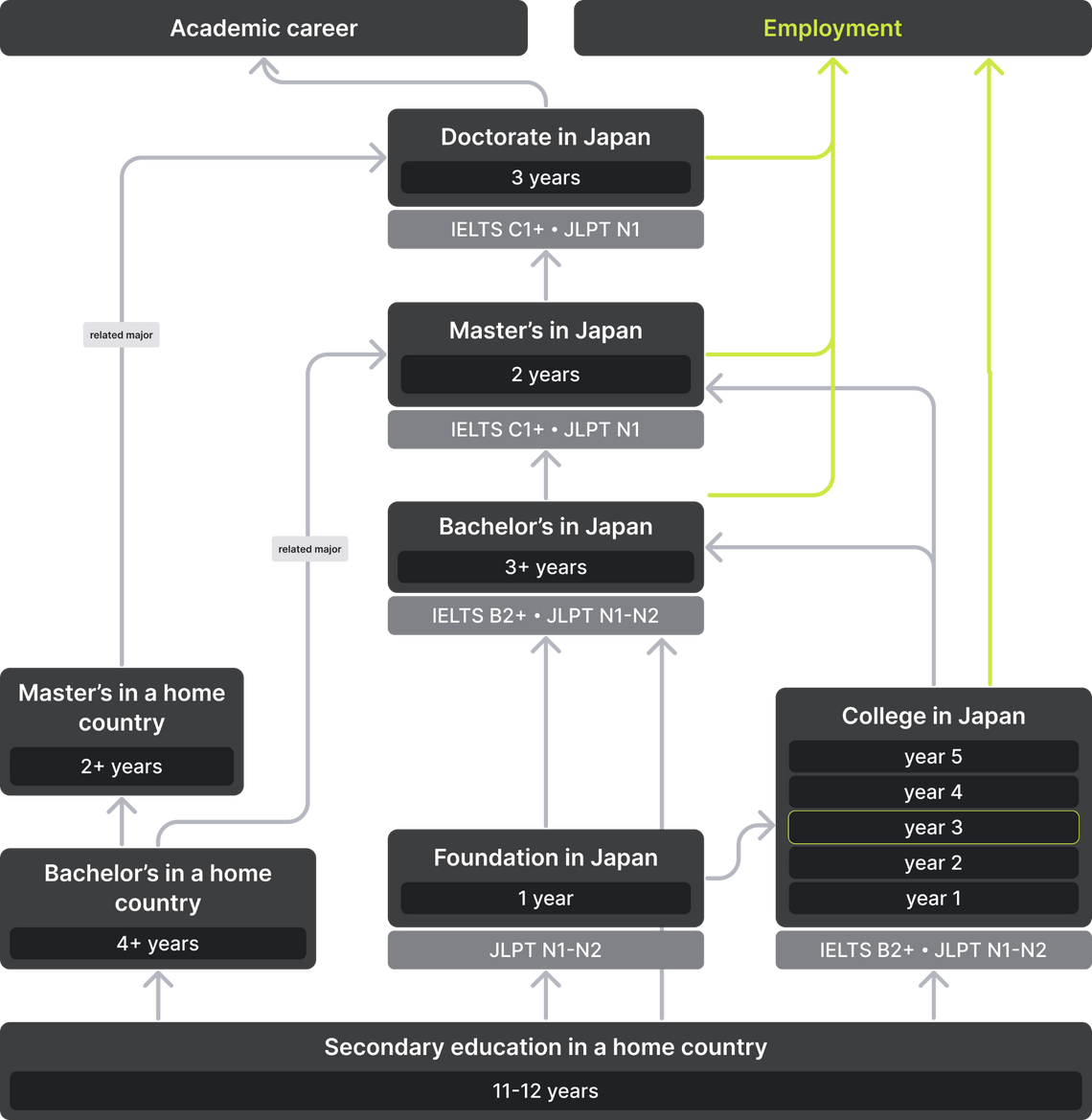
Foundation — Preparatory programs in Japan
In order to enroll in a Japanese university, applicants must graduate from the 12th grade of high school. Students from countries where the school lasts for 11 years can complete one year of the university in their country or take preparatory courses in Japan.
Such courses take from 1 to 2 years. Education starts in April or in October (if the course takes 1.5 years).
| University | Duration | City | Cost |
|---|---|---|---|
| Tokyo University of Social welfare | 2 years | Tokyo | 6,204 USD |
| Kyoto Seizan College |
| Kyoto |
|
| Osaka International University | 1 year | Osaka | 3,684 USD |
| Chiba Institute of Science | 1 year | Chiba | 3,877 USD |
| Nanzan University | 1 year | Nagoya | 4,394 USD |
A complete list of available courses can be found here.
Training is conducted in Japanese, so all applicants must know Japanese at least at the level of N5 (A1).
The curriculum consists not only of Japanese classes but also subjects in the chosen field. In humanities programs, students study English, mathematics, geography, history, political science, and economics. In science programs, students study English, mathematics, physics, biology, and chemistry. The program is designed to prepare students for the JLPT (Japanese Language Proficiency Test) and the entrance examination EJU (Examination for Japanese University Admission for International Students) before entering the university.

College — Vocational education in Japan
In Japan there are three types of colleges:
| College type | Duration | Degree |
|---|---|---|
| Junior | 2 — 3 years | Associate’s degree |
| College of technology | 5 years (3 years) | Associate’s degree |
| Professional | 2 — 3 years | Diploma / Advanced diploma (professional degree) |
- Junior colleges mainly provide training for students in the humanities, healthcare, and pedagogy. Graduates can either enter universities to continue their studies or seek work.
- Сolleges of technology are higher education institutions offering a five-year program for 9th-grade graduates. As a rule, foreign students begin their studies immediately from the third year, skipping the first two years. Such colleges train highly qualified specialists who are versed in the latest technical developments. Graduates of technology colleges obtain an associate degree. They can also continue their studies for an additional two years, after which they have the opportunity to obtain a bachelor's degree by passing a special exam.
- Professional colleges organize specialized higher education courses for high school graduates (12th grade). The training here is carried out in the following areas: medicine, technology, culture and general education, business, hygiene, education and social well-being, fashion and home economics, agriculture. After completing the courses, students with a specialist diploma can find a job or go to university for undergraduate programs. In addition, students can choose to undergo two additional years of study in order to receive an advanced diploma and be able to immediately apply for master's programs.
Bachelor’s in Japan — Undergraduate
Undergraduate programs normally last for 4 years. Students that specialize in medical fields (medical business, dentistry, veterinary medicine) study for 6 years.
The academic year begins in April and ends in March of the following year.
The curriculum consists of theoretical studies, lectures, seminars, laboratory work, master classes, internships, and research. At the end of their studies, students usually write and defend a scientific thesis. Bachelor graduates have the right to seek work or apply for master’s.
Master's and Doctoral — Graduate/Postgraduate in Japan
Master's and doctoral programs are organized by graduate schools, which can be either independent educational institutions or part of universities.
Studies usually last for two years. Subjects are divided into three categories: basic, research and electives. The first three semesters are devoted to the study of theory, and the last semester is devoted to writing a research paper (thesis). At the end of the training, students pass the final exams and defend their work.

Doctoral studies — Postgraduate in Japan
Doctoral studies take 3 years on average. For admission, students must have a master's degree and pass the entrance tests. In addition, students usually should contact the future supervisor in advance by sending a letter with the goals and objectives, explaining the relevance of the work, as well as a detailed outline of the planned study.
Academic career
An academic career in Japan consists of the following steps:
- Researcher (Jokyō);
- Lecturer (Kōshi);
- Associate Professor (Junkyōju);
- Professor (Kyōju);
- Senior Professor (Meiyo Kyōju).
Classes are usually taught by professors, associate professors, and lecturers, while lab work and workshops are usually led by researchers. All posts can be either permanent or temporary. The latter include the word "tokunin" in the title.
In Japan, there are no strict requirements for obtaining each title/position — universities can set the criteria on their own. The basic requirements are a doctoral degree and knowledge of English at C1+ level.
Work while studying in Japan
A student visa allows students to work part-time (up to 28 hours a week) and full-time up to 8 hours a day during the break. The average minimum wage is 5 USD/hour but may vary in different prefectures (for example, in Tokyo, the minimum wage is 6 USD/hour). Typically, students receive about 381 USD/month.
Most often, students can find work in the service or teaching sector, in any case, an important requirement will be fluency in Japanese.
Immigration opportunities
After graduation, foreign students can stay to work in the country. In order to have the right to stay in the country for the purpose of work, it is necessary to exchange a student visa for a work permit after employment. Often, while studying, students would get an internship at a company in which they want to continue working after graduation, and when it happens, they are ready to sign a contract.
Work permit documents
- Two copies of the visa application form;
- International passport;
- Passport;
- Two passport photographs;
- Japanese university degree/diploma;
- Eligibility certificate.
To obtain Japanese citizenship it is necessary:
- To live in the country for at least 5 consecutive years (time spent in Japan on a student visa is not taken into account);
- Be over 20 years old (or other legal age established in the alien’s home country);
- Confirm that there is no criminal record, as well as any other violations of the law (even one speeding fine can affect the decision of the commission);
- Obtain and present a certificate of the National Pension System of Japan;
- Confirm the ability to provide for yourself;
- Abandon home country citizenship;
- Sign a document stating that the foreigner was never a member of political or other organizations that planned to destroy or called for the destruction of the Japanese state and constitution.

Prospects and job opportunities in Japan
Japan is one of the countries with the lowest unemployment rate in the world — only 2.3% (average rate — 5%)[9]. The minimum wage is 6 USD/hour. The availability of jobs at the moment is 1.57, that is, 100 potential candidates for 157 vacancies.
Want to study at a foreign university but don't know where to start? We can help!
Our specialists will find a university, arrange your documents, fill out the applications, and stay in touch until you receive an offer.

